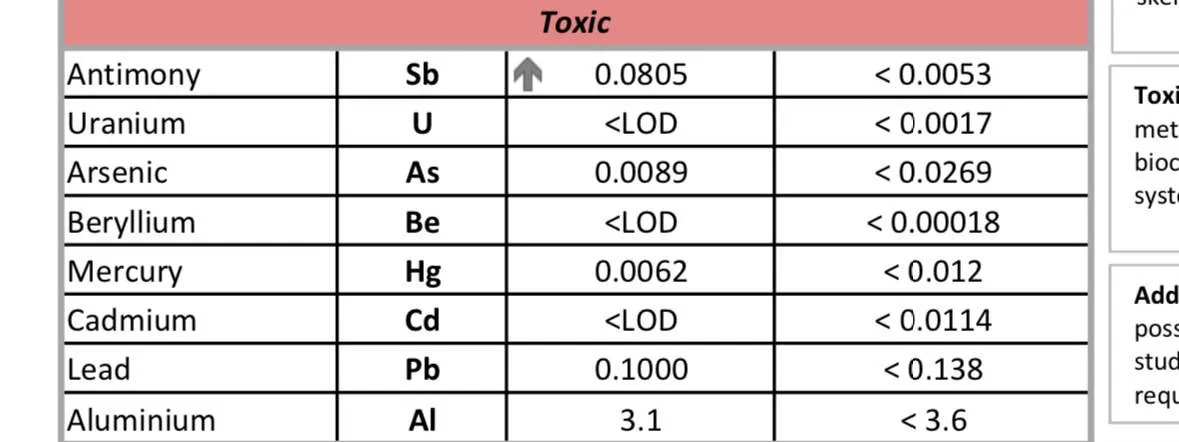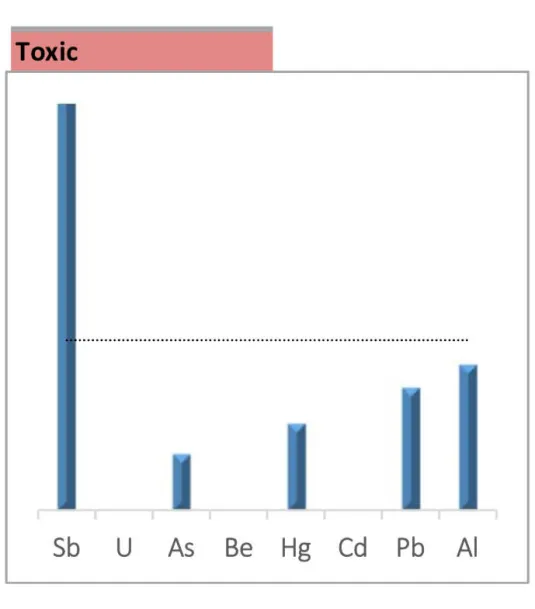anemic (heavy metal toxicity?)
-
I have posted here about my health concerns, essentially being stuck in a hypometabolic state despite trying all sorts of things... could this explain everything?


-
high selenium as well as sulphur foods like cabbage family including broccolli detox antimony. broccoli sprouts would probably be the best-- they are annoying to sprout without getting moldy and they taste horrific, and the proper method to get max sulforaphane content involves freezing and blending, but it will work better than anything else other than chelating drugs.
-
If you suspect heavy metal toxicity do some research into modified citrus pectin, it is expensive but seems to be a promising therapeutic for safe heavy metal detox.
-
you can get anemic from the presence of heavy metals in your system. It's because heavy metals can lodge into issues and push out iron from tissues where it does not react with lipids and bacteria. Once iron is pushed out it becomes free iron, and readily reacts and causes bacteria to multiply, and for reactive lipids (PUFA) to carry out chain reactions where ROS is produced.
In such an environment, the body will tend to keep iron stored in ferritin to keep iron from being harmful to the body. But in so doing, the available iron needed to make red blood cells will be lessened as well. This leads towards anemia.
-
@sneedful
well, I’ve taken selenium and MSM and it didn’t have any effect
-
I guess DMPS will do the trick? Although I don’t know where to get it…
-
@winters said in anemic (heavy metal toxicity?):
I guess DMPS will do the trick? Although I don’t know where to get it…
DMPS is NOT a good idea. Research it. Do some serious research re. what is recommended to use to detox from antimony.
DMSA might be helpful. Not DMPS.
see these:
Interactions of antimony with biomolecules and its effects on human health
"Sb could be excreted from the human body through urine and defecation, although defecation is not considered excretion in medical science and biology because it is a food residue that is unabsorbed by organisms. Due to the greater difficulty involved in obtaining and treating samples, numerous studies have been conducted on urine. Rapid renal excretion is main pathway to eliminate Sb(V) (Kip et al., 2018). As shown in 2.2 and Table S1, people who are exposed to high levels of Sb will have higher Sb levels in urine. Recent results showed different excretion rates in urine: 0.08 μg/24 h in Sweden (Barregard et al., 2021) and 0.15 μg/24 h in China (Wang et al., 2019c). In addition, some chemicals influence the excretion of Sb, such as dimercaptosuccinic acid, which can treat autism spectrum disorder and somewhat increase the concentration of Sb in urine (Adams et al., 2009)."Antimony causes high oxidative stress. High oxidative stress depletes thiamine. It also depletes glutathione. High dose thiamine hcl resolved my high oxidative stress caused by mercury toxicity; it also allowed my glutathione level to normalize.
-
@mostlylurking
okay, but I don’t know where I can get that without a prescription
-
@winters You need to find a good detox doctor to help you. This is a serious medical situation. Detoxing by chelation is serious business.
I don't know about antimony specifically except for what I found about it last night (posted above). The recommended chelator in the article is DMSA. DMPS is some dangerous stuff; not recommended by detox professionals.
I've been chelated (EDTA IV's, over 100 treatments) for heavy metal poisoning (lead, arsenic, cadmium, et. al.) and have also been chelated for mercury (DMSA capsule, followed by EDTA IV, 20 treatments). I've still got the mercury problem though and probably always will. Mercury is notoriously difficult/impossible to get out of the body.
I experienced tremendous improvement in my health problems from taking high dose thiamine hcl. I follow Dr. Costantini's protocol. He was a neurologist in Italy who treated Parkinson's Disease patients with thiamine hcl.
Mercury (and other heavy metals, including antimony) cause high oxidative stress. High oxidative stress depletes thiamine. It's the thiamine deficiency which is so dangerous. Thiamine is vitamin B1. You can get it over the counter. There are multiple types of thiamine. TTFD is newer and experts like to recommend it but it uses up glutathione. If you have heavy metal poisoning, which results in high oxidative stress, your glutathione level will be greatly reduced which makes it more likely to have a negative reaction to TTFD.
Antimony is known to cause poor glutathione status (by causing high oxidative stress). Thiamine hcl is known to lower oxidative stress and it is known to normalize the body's glutathione level. I experienced this improvement myself.
suggested reading: https://www.mercuryfreekids.org/mercury101/2018/1/21/thiamine-savesalso: Thiamine-Responsive Megaloblastic Anemia Syndrome
also:
Interaction of antimony tartrate with the tripeptide glutathione implication for its mode of action
"The tripeptide glutathione (gamma-L-Glu-L-Cys-Gly, GSH) is thought to play an important role in the biological processing of antimony drugs."If your glutathione level has been depleted because your antimony poisoning has caused high oxidative stress, then you won't have enough glutathione to help your body to "process"/detox the antimony. The body's glutathione level is notoriously difficult to improve; you can't simply take glutathione; it doesn't work that way. But my own glutathione level normalized in around 4 months when taking high dose thiamine hcl per Dr. Costantini's protocol.
I am not a doctor and this is not medical advice. I am simply sharing my own experiences.
-
Modified citrus pectin appears to be another over-the-counter option.
The Effect of Modified Citrus Pectin on
Urinary Excretion of Toxic Elements (2006) -
@DavidPS bad link.
-
@mostlylurking - Thanks, the link works for me. Here is an alternative link to the full text.
https://sci-hub.se/10.1002/ptr.1953 -
The effect of modified citrus pectin on urinary excretion of toxic elements
"This pilot trial provides the first evidence that oral administration of MCP increases significantly the urinary excretion of toxic metals in subjects with a 'normal' body load of metals. It is suggested that systemic chelation of toxic metals by MCP may in part be attributable to the presence of rhamnogalacturonan II, which has been shown previously to chelate metals. "
-
@DavidPS Interesting article; sounds like it would help.
Thiamine is recommended for lead poisoning in veterinary medicine. https://www.merckvetmanual.com/toxicology/lead-poisoning/lead-poisoning-in-animals#Treatment_v3354065 (search for Thiamine).
also:
The therapeutic potential of thiamine for treatment of experimentally induced subacute lead poisoning in sheep "These results suggest that thiamine might have some therapeutic effects on lead poisoning, but the zinc status of depletion should be considered during long periods of treatment."
also
Effect of thiamine on the cadmium–chelating capacity of thiol compounds "In conclusion, the administration of thiamine during chelation therapy in cadmium poisoning may be beneficial and more effective than thiol chelating agents alone, which needs to be confirmed in humans." -
Some herbal detox agents:
Heavy metals detoxification: A review of herbal compounds for chelation therapy in heavy metals toxicity -
@Prometheus88
Give a nigga some credit



-
This post is deleted! -
This post is deleted! -
This post is deleted! -
This post is deleted!